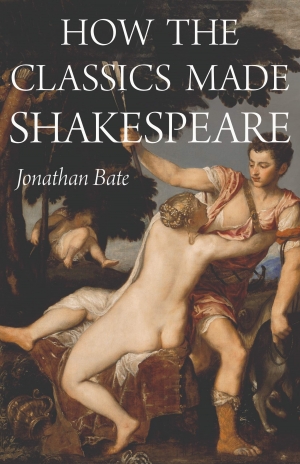Princeton University Press
James Antoniou reviews 'The Drama of Celebrity' by Sharon Marcus
According to Angela Carter, who wrote perceptively on the subject, ‘the pleasantest, most evanescent kind of fame … is that during your own lifetime’. By the end of her life, Carter had cultivated her own celebrity: she was interviewed on television, adapted her own work for the BBC, and won several awards. Academia is often interested in celebrity when it is, ...
Cameo Dalley reviews 'Red Meat Republic: A hoof-to-table history of how beef changed America' by Joshua Specht
During a steamy Brisbane summer in the early 1990s, my father planned an outing for his preteen children, an adventure that would punctuate an otherwise predictable cycle of sleepovers, movies, and trips to the swimming pool. At the time, Dad was a board member of the Queensland Abattoir Corporation, and his idea of entertainment was a guided tour of the nearby Cann ...
William Poulos reviews How To Keep Your Cool by Seneca and How To Be a Friend by Marcus Tullius Cicero
‘Serenity now,’ repeated Seinfeld’s Frank Costanza whenever his blood pressure got too high. His doctor recommended this anger-management technique, but he might as well have got it from Seneca, whose De Ira (Of Anger) James Romm has edited ...
... (read more)David McInnis reviews 'How the Classics Made Shakespeare' by Jonathan Bate
Ben Jonson famously derided Shakespeare’s grasp of ‘small Latin and less Greek’, and vocal sceptics in our own time refuse to believe that a grammar-school education was sufficient to enable the man from Stratford to write the plays attributed to ‘Shakespeare’ ...
... (read more)Lewis Rosenberg reviews Walter Kaufmann: Philosopher, humanist, heretic by Stanley Corngold
My favourite image from Stanley Corngold’s Walter Kaufmann: Philosopher, humanist, heretic is set in Berlin as World War II concludes. Young Walter Kaufmann, a German Jew forced to flee the National Socialist regime to the United States, has returned to his native land as part of the occupying forces ...
... (read more)Frank Jackson reviews 'Essays and Reviews 1959-2002' by Bernard Williams
Philosophers fear many things, as do economists, lawyers, politicians, and electricians. But there is one thing philosophers fear which is special to their profession. It is the question, asked as it might be at a dinner party or in a taxi on the way to the airport, ‘What is it that you do, exactly?’ with perhaps a somewhat intimidating emphasis on the word ‘exactly’. Often – too often – we philosophers take the easy way out. We reply that questions like: Does God exist? Is there an objective basis to morality? Is a commitment to equality simply a commitment to equality of opportunity? What makes a society a just one? are, we can all agree, important questions, and that they are the kinds of questions philosophers concern themselves with.
... (read more)Adrian Walsh reviews 'The Worldly Philosopher: The odyssey of Albert O. Hirschman' by Jeremy Adelman and 'The Essential Hirschman' edited by Jeremy Adelman
Albert O. Hirschman (1915–2012) was a development economist and political theorist whose work is essential reading for anyone interested in understanding how economic life figures in the political worlds we inhabit and the ways in which we give meaning to our lives in market-based societies. Perhaps best known for the distinction between ‘exit’ and ‘voice’, Hirschman was a prolific theorist who wrote about the role individual moral virtue and individual self-interest should play in economic activity, how economic growth in the developing world might best be achieved, and the reactionary rhetoric of neo-conservative politicians in the late 1980s, to list but some of the areas he covered. Hirschman’s writing was elegant; further, he understood the importance of the well-chosen word. He was, as this new biography by Jeremy Adelman shows, an economist for whom the essays of Montaigne were as important as the writings of Ricardo and Smith.
... (read more)Tim Oakley reviews 'Mirror, Mirror: The uses and abuses of self-love' by Simon Blackburn
Everyone knows the emotions of self-concern – self-esteem, pride, vanity, self-respect – and associated character traits – authenticity, arrogance, humility, and the like. Yet as soon as we start to think seriously about them and the roles they play in personal and social life, they tantalise with their ambiguities and their resistance to easy definition. Some forms of self-concern, such as arrogance and hubris, are disagreeable. Yet others, such as self-respect, seem desirable. Why? And what is self-respect exactly, anyway? How much do these various emotions and dispositions contribute to (or detract from) a good or decent life?
... (read more)Stephen Buckle on 'The Philosopher, the Priest, and the Painter'
In this short and accessible book, Steven Nadler, an accomplished historian of seventeenth-century philosophy, turns his attention to René Descartes (1596–1650) and his cultural milieu in Holland in the 1630s and 1640s. His angle of approach is to take the familiar portrait of Descartes, attributed to Frans Hals – versions of which grace the covers of the vast majority of textbook editions of Descartes’s works – and to illuminate the three intersecting lives to which it bears tribute.
... (read more)David McCooey reviews 'The Princeton Encyclopedia of Poetry and Poetics, Fourth Edition' by Roland Greene et al.
It’s not just history that is written by the victors, but the encyclopedias, too. The eighteenth-century encyclopedias, such as Diderot’s Encyclopédie, were the projects of emergent superpowers, evidence of both the Enlightenment dream of universal knowledge and burgeoning colonial impulses ...
... (read more)









